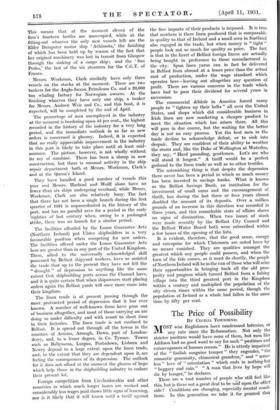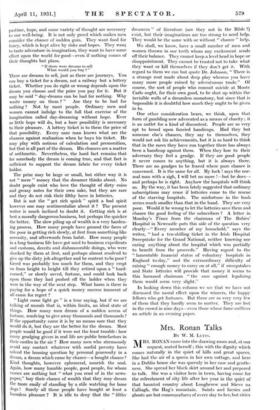The Price of Possibility
BY CECILIA TOWNSEND.
MOST wise Englishmen have condemned lotteries, at any rate since the Reformation. Not only the stricter puritans would have none of them, but men like Addison had no good word to say for such " pastimes and extravagances of human reason." He is utterly impatient of the " foolish sanguine temper" they engender, "the romantic generosity, chimerical grandeur," and " sense- less " love of " ostentation " which ends in nothing but " beggary and ruin." " A man that lives by hope will die by hunger," he declares. There are a vast number of people who still feel like this, but is there not a great deal to be said upon the other side? Conditions are changing, especially mental condi- tions. " In this generation we take it- for granted that pastime, hope, and some variety of thought are necessary to our well-being. It is not only greed which makes men consider the chance of sudden gain. They want food for fancy, which is kept alive by risks and hopes. They want to taste adventure in imagination, they want to have some effect upon the world for good—even if nothing comes of their thoughts but plans.
"If there were dreams to sell What would you buy ? "
There are dreams to sell, just as there are journeys. You can buy a ticket for a dream, not a railway but a lottery ticket. Whether you do right or wrong depends upon the dream you choose and the price you pay for it. But it may be said " day-dreams can be had for nothing. Why waste money on them ? " Are they to be had for nothing ? Not by most people. Ordinary men and women cannot indulge to the full that exercise of the imagination called day-dreaming without hope. Ever so little hope will do, but a bare possibility is necessary to their pleasure. A lottery ticket is to them the price of that possibility. Every sane man knows what are the chances against realization when he buys his ticket. He may play with notions of calculation and premonition, but that is all part of the dream. His chances are a matter of arithmetic. Nevertheless, the hard fact remains that for somebody the dream is coming true, and that fact is sufficient to support the dream fabric for every ticket holder.
The prize may be large or small, but either way it is not " mere " money that the dreamer thinks about. No doubt people exist who love the 'thought of dirty coins and greasy notes for their own sake, but they are rare and they do not risk their filthy lucre in lotteries.
But is not the " get rich quick " spirit a bad spirit however one may sentimentalize about it ? The present writer is much inclined to doubt it. Getting rich is at best a morally dangerous business, but perhaps the quicker the better. The slow piling up of wealth is a very harden- ing process. How many people have ground the faces of the poor in getting rich slowly, at first from something like necessity, and afterwards from habit. How many people in a long business life have got used to business expedients and customs, deceits and dishonourable doings, who were shocked by them at first, and perhaps almost resolved to give up the dirty job altogether and be content to be poor? Greed was probably too much for them, and they crept on from height to height till they retired upon a " hard- earned," or slowly saved, fortune, and could look back upon those they had pushed off the ladder when they were in the way of the next step. What harm is there in paying for a hope of a quick money success innocent of all cause for regret ?
" Light come light go " is a true saying, but if we are talking of morals that is, within limits, an ideal state of things. How many men dream of a sudden access of fortune, resolving to give away thousands and thousands ? If the opportunity came it is by no means sure that they Mould do it, but they are the better for the dream. Most people would be good if it were not the least trouble : how many grudging givers in real life are public benefactors in their castles in the air ? How many men who strenuously avoid any contact whatever with sordid poverty have solved the housing question by personal generosity in a dream, a dream which came by chance—a bought chance? Kind thoughts, however ephemeral, nourish the soul. Again, how many humble people, good people, for whom causes are nothing but " what you read of in the news- paper," buy their chance of wealth that they may dream the more easily of standing by a stile watching for lame dogs ! Surely . all those people have bought at' least a harmless pleasure ? It is idle to deny that the " filthy dreamers " of literature (are they not in the Bible ?) exist, but their imaginations are too strong to need help. They would be the same with or without " chance " help.
We shall, we know, have a small number of men and women thrown in our teeth whom any excitement sends off their balance. They cannot keep a level head in hope or disappointment. They cannot be trusted not to take what they want or kill themselves if they don't get it. With regard to them we can but quote Dr. Johnson, " There is a strange rout made about deep play whereas you have many more people ruined by adventurous trade." Of course, the sort of people who commit suicide at Monte Carlo ought, for their own good, to be shut up within the invisible walls of a dreamless monotony, but since that is impossible it is doubtful how much they ought to be given in to.
One other consideration bears, we think, upon that form of gambling now advocated as a means of charity ; it is an outlet for a kind of discontent. People are so very apt to brood upon fancied handicaps. Had they but someone else's chances, they say to themselves, they would not ask his achievements, but it is so hard to think that in the races they have run together there has always been a handicap against them. When they lose to their adversary they feel a grudge. If they are good people it never comes to anything, but it is always there. There are no- grudges to be feared where pure chance is concerned. It is the same for all. My luck ! says the nor- mal man with a sigh, I will bet no more !—but he does— and perhaps he is right. Anyhow the hospitals will think so. By the way, it has been lately suggested that ordinary subscriptions may cease if lotteries come to the rescue of the starving hospitals. The misfortune in the bush seems much smaller than that in the hand. They arc very poor. Would it be wrong to let the lotteries save them and chance the good feeling of the subscribers ? A letter in Monday's Times from the chairman of The Babies' Hospital in Newcastle puts this side of the question very clearly—" Every member of my household," says the writer, " had a ten-shilling ticket in the Irish Hospital Sweepstake for the Grand National, neither knowing nor caring anything about the hospital which was partially to benefit from the proceeds." Having regard to the " lamentable financial status of voluntary hospitals in England to-day," and the extraordinary difficulty of raising " enough money to carry on at all," if sweepstakes and State lotteries will provide that money it seems to this harassed chairman " the case against legalizing them would seem very slight."
In looking down this column we see that we have not discussed the moral effect upon the winners, the happy fellows who get fortunes. But there are so very very few of them that they hardly seem to matter. They are lost in the crowd in nine days—even those whose fame outlives an article in' an evening paper.











































 Previous page
Previous page